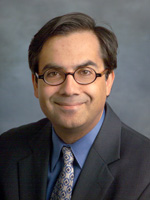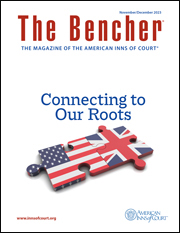The Roots of American Legal Ethics Codes
The Bencher | November/December 2023
By John P. Ratnaswamy, Esquire

 The first written code of ethics for lawyers in the United States was the Code of Ethics adopted by the Alabama State Bar Association on December 14, 18871. The Alabama Code was the foundation of the original Canons of Ethics adopted by the American Bar Association (ABA) in Seattle, Washington, on August 27, 1908.2
The first written code of ethics for lawyers in the United States was the Code of Ethics adopted by the Alabama State Bar Association on December 14, 18871. The Alabama Code was the foundation of the original Canons of Ethics adopted by the American Bar Association (ABA) in Seattle, Washington, on August 27, 1908.2
The discussions on code adoption in Alabama and Seattle perhaps give us some insights into how prominent lawyers at the time viewed the nature of the legal profession. That proposition should be tempered by keeping in mind the unrepresentative demographics of the profession—the ABA had no women members until 1918 and no Black members (apart from one or more rescinded memberships) until 1950, three years after Jackie Robinson became the first Black man to play Major League Baseball.
I submit that the Alabama and ABA codes appear largely to reflect goals of protecting clients and the public from lawyer misconduct and preserving the reputation of the profession to promote the ends of justice. I also submit that the codes reflect a model of the profession in which the lawyer must provide clients with good counsel consistent with the ethics rules and is not mandated to take every legal advantage on behalf of clients.
The Alabama Code was conceived in 1881 as serving the educational purpose of helping to keep lawyers from engaging in “thoughtless” and “willful” “practices of questionable propriety” and to help preserve the status of the profession by showing that it had issued “its warning voice in advance against these pernicious practices.” First Legal Code, p. 111. The Preamble of the ABA Code stressed that the stability of the courts and government rested upon public approval and that the public needed to have “absolute confidence in the integrity and impartiality of…[the] administration” of justice. Report, p. 575.
The Alabama Code adoption debate included sentiment that the code should state a “Code of Morals for the practice of law” regardless of whether practices it barred were common. The deliberations made mandatory a ban on bringing a civil case when the “purpose is to merely to harass or injure the opposite party, or to work oppression or wrong,” while removing a requirement that, having taken a case, a lawyer must take “all lawful advantages in favor of his client.” The deliberations rejected an attempt to remove a bar on offering inadmissible evidence through the guise of arguing its admissibility and removed language stating lawyers should not conduct their own case because it is an “American privilege to make a fool of yourself.” First Legal Code, pp. 112–113.
The ABA Code adoption debate was not as general, which perhaps is not surprising given that 26 states had codes of ethics by 1908, many based on the Alabama Code. The primary subject of the debate was a heartfelt defense of contingent fees as a means of providing legal services to those who otherwise could not afford a lawyer. That discussion led to amending the draft code to be neutral on that fee structure, while providing for the court’s role in making sure the fee is not excessive. See report, pp. 55–86.
The world and the legal world are very different now. Still, the Alabama and ABA codes appear to me to signal favor for a still-powerful concept of the lawyer as a professional who owes duties to his or her clients but who must perform those duties within the framework of ethical practice.
1. See, e.g., W. Jones, “First Legal Code of Ethics Adopted in the United States,” American Bar Association Journal, Vol. 8, No. 2 (Feb. 1922), pp. 111–113 (“First Legal Code”).
2. See Final Report of the [ABA] Committee on Code of Professional Ethics, which may be found in the Report of the Thirty-First Annual Meeting of the American Bar to the ABA Annual Meeting (1908), pp. 567–586.
John Ratnaswamy is the founder of The Law Office of John Ratnaswamy LLC in Chicago, Illinois. He has served as an adjunct professor of legal ethics at Northwestern University School of Law, a member of the Hearing Board of the Illinois Attorney Registration & Disciplinary Commission, and as a member of the American Bar Association’s Standing Committee on Ethics and Professional Responsibility. This column should not be understood to represent the views of any of those entities or Ratnaswamy’s or the firm’s current or former clients.